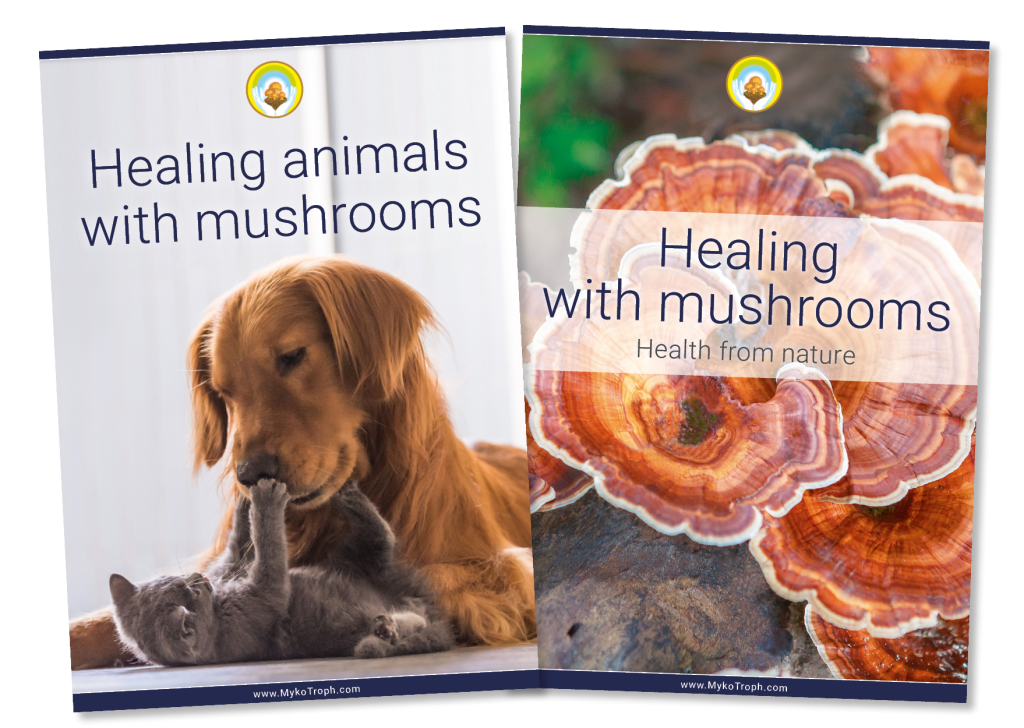
Each animal is unique!
Our experienced team will be happy to advise you in detail and free of charge on all matters relating to your pet’s health :
Disease of the pancreas in animals
Alternative therapeutic approaches with medicinal mushrooms
October 28, 2021
Petra Remsing – veterinary practitioner
Abdominal rumbling, flatulence, diarrhea, vomiting and feed intolerances: The symptoms of pancreatic diseases or pancreatic insufficiency are often non-specific. They fit many diseases of the digestive system. Especially at the beginning of the symptoms, this often does not make you think of the pancreas.
However, diseases of this organ have also steadily increased in dogs and cats in recent years. Especially flavor enhancers, synthetic vitamins, flavorings, preservatives and low-quality feed components are often involved in the development of pancreatic diseases.
Many factors overtax this sensitive organ, so that far more enzymes are needed than the pancreas can produce. To optimally support your pet’s healing process, we recommend alternative therapy approaches. Especially the vital mushrooms can play a central role here.
Acute pancreatitis / Acute pancreatitis
In acute pancreatitis, there is activation of digestive enzymes directly in the pancreas, resulting in self-digestion or, in the worst case, even self-digestion. Dogs are more likely to develop acute pancreatitis than cats, although both dogs and cats are more likely to develop the chronic form.
Simply request free information brochures now!

After you have sent the completed form, you will receive an e-mail with a download link.
Cause of the disease in dogs
The most common cause of acute pancreatitis in dogs is severe obesity, along with a lack of exercise. However, it can also occur after a one-time very fatty meal, for example, when the dog has feasted on the cold frying fat.
Other possible causes include hormonal disorders such as Cushing’s disease, diabetes mellitus or hypothyroidism (underactive thyroid gland), and elevated blood lipid levels (especially triclycerides). A very carbohydrate-heavy diet can also be responsible for pancreatitis. High levels of cereals, pasta, potatoes or bread lead to elevated and stressful triglycerides.

Each animal is unique!
Our experienced team will be happy to advise you in detail and free of charge on all matters relating to the health of your pet:
Maitake for elevated triglycerides
Here we can use the vital mushroom Maitake. Maitake causes an increased release of cholesterol and triglycerides from the organs. One thing to keep in mind, however, is that at the beginning of treatment, there are elevated levels of cholesterol and triglycerides in the blood. This later returns to normal and the Maitake then prevents a renewed increase. It also lowers total cholesterol. In addition, it still promotes fat burning and counteracts the development of fatty liver.
Symptoms in dogs
The main symptom of acute pancreatitis in dogs is vomiting. It occurs in approximately 90% of animal patients. 80% suffer from weakness and only 60% have pain. Animals in pain then have a very tense abdomen and sometimes very severe pain. Fever occurs in only about 20%. Alternating diarrhea is not one of the classic symptoms. Although the animals are initially hungry, when they then have the food bowl in front of them, they turn their heads away and no longer want to eat.
Pancreatitis in the cat
In the cat, acute pancreatitis often occurs together with cholangiohepatitis, which is an inflammation of the bile duct involving the liver, or with so-called IBD, a chronic inflammatory bowel disease. Three organs are inflamed here and that is why this disease is also called triaditis.
Other causes in the cat are infectious diseases, such as Feline Herpes Virus, Calici Virus or Toxoplasma Gondii and others.
In the cat, three forms of progression are distinguished. Once the mild form or acute edematous pancreatitis. It is often overlooked because the animals show no symptoms. Then there are the two severe forms, acute necrotizing and acute purulent, also called suppurative pancreatitis.
The symptoms in the cat are quite different from those in the dog and are rather non-specific. The leading symptom in the cat is apathy. So the animals are apathetic. This occurs in all animals. 97% suffer from loss of appetite, 92% from dehydration, i.e. dehydration. Diarrhea and vomiting show only 15-35% of all animals, abdominal pain even only 25%. For this reason, pancreatitis in cats is very often overlooked.

Each animal is unique!
Our experienced team will be happy to advise you in detail and free of charge on all matters relating to the health of your pet:
Vital mushrooms for acute pancreatitis
Naturopathically, dogs and cats with acute pancreatitis can be very well supported with OPC and medicinal mushrooms. Oligomeric procyanidins – OPC for short – are one of the most effective antioxidants. They neutralize free radicals and are particularly suitable for all inflammatory processes.
Coprinus - the most important medicinal mushroom for the regeneration of the pancreas.
The vital mushroom Coprinus protects the islets of Langerhans of the pancreas, i.e. the endocrine system. It has proven to be “the remedy” for pancreas regeneration. After just a few days of use, the animals’ symptoms can improve considerably, and after a while, their pancreas values can improve as well.
Of course, this takes longer because the pancreas in particular is an organ that takes quite a long time to regenerate. Coprinus is the most important fungus in the treatment of pancreatic diseases. It does not cause any initial reactions and can therefore be taken without a phase-in period. In pancreatic disorders, Coprinus should be given with each feeding if possible.
The medicinal mushroom ABM detoxifies and protects the liver
ABM (Agaricus blazei murrill) has been proven in empirical medicine to be a balm for pancreatic disorders. It is an immune regulator and has a protective function on the islets of Langerhans. Its beta-glucans slow down the absorption of sugar through the intestine and it has a detoxifying and protective effect on the liver.
Reishi has an anti-inflammatory effect
Reishi, like ABM, is an immune regulator. It contains the most triterpenes of all medicinal mushrooms. The triterpenes are predominantly found in the fruiting body and spores. Reishi improves detoxification of the liver and promotes digestion. It has an anti-inflammatory and cortisone-like effect. It is also balancing in case of inner restlessness. The dosage of Reishi should always be gradual, with a low dose.
Chronic Pancreatitis / Chronic Pancreatitis
Also in chronic pancreatitis, two degrees of severity are distinguished: the mild and the acute form. Mild courses are more common in both dogs and cats. Cats are even more likely to develop chronic pancreatitis than dogs.
In chronic pancreatitis, recurrent or ongoing inflammation leads to atrophy of the pancreas, i.e., tissue destruction or fibrosis. This is the transformation of pancreatic tissue into connective tissue. Necrosis is also possible, in which case the tissue dies. In this process, the acini cells are destroyed and a deficiency of digestive enzymes subsequently occurs, since enzyme production no longer takes place in the remodeled tissue.
Depending on how much acini cells have been destroyed, pancreatic insufficiency may subsequently develop. If islet cells are also affected, i.e. the ß-cells of the pancreas, diabetes mellitus also results.
Chronic form in dogs
Dogs are more likely to contract the recurrent form. In this case, phases with digestive disorders occur again and again. Symptoms include intermittent vomiting, which is vomiting that comes and then is gone and then comes back after a time, or diarrhea. Pain is less frequent and if not as severe as in acute pancreatitis. They usually subside again on their own. The mild form may develop into a severe course.
Common causes of chronic pancreatitis in dogs are inflammation of the intestine but also inflammation of the liver or stomach.
Cats with chronic disease of the organ
In the cat, chronic pancreatitis often occurs as triaditis. In this case, there is often a vitamin K deficiency. In about one in three cats, pancreatitis occurs together with other diseases. For example, with hepatic lipidosis, diabetes mellitus, or hepatitis.
Because of the non-specific symptoms, such as lethargy, lack of appetite, dehydration and weight loss, chronic pancreatitis is also very often overlooked, especially in the cat. Again, pain is rare, vomiting is absent or intermittent. Diarrhea is usually associated by the owner, with a pre-existing intestinal disease.
Therapy of the chronic form
Here, too, the animals can of course be supported very well with OPC, but also with medicinal mushrooms. In addition to ABM, Coprinus and Reishi, the intestines should also be supported in chronic pancreatitis. Here, the Hericium performs very well.
It is an important fungus in diseases of the digestive tract. Hericium regenerates the stomach and intestinal mucosa. The intestinal mucosa has a great influence on the immune system. If the intestinal mucosa is permeable, toxic metabolic products enter the blood and burden the liver in particular. Hericium rebuilds the damaged intestinal wall and thus relieves the metabolism.
For mushroom powders there are many suppliers
You will find trustworthy suppliers with controlled organic cultivation in Germany, but unfortunately also less recommendable importers of cheap goods. Read what is important when buying.
DO YOU HAVE ANY QUESTIONS?
We will gladly take time for you. In our free consultation we answer individually and personally all your questions about the health of your pet under:
Sources:
- Practical course of the dog clinic, 10th edition 2006 Parey in MVS Stuttgart GmbH, Peter F.Suter, Barbara Kohn, ISBN 978-3-8304-4141-0
- Naturopathy for dogs, 2nd edition 2003, Kosmos Verlag, Dr. med. vet. Wolfgang Becvar, ISBN 978-3-440-09817-2
- Diet management in dogs and cats, Gustav Fischer Verlag 1996, Christine Iben, ISBN 3-334-60903-0
- Nutritional counseling in small animal practice, 1st edition 2009, Elsevier GmbH Munich, Natalie Dillitzer, ISBN 978-3-437-58310-0.
- https://www.thieme-connect.com/products/ejournals/abstract/10.1055/s-0030-1262221
- http://www.vet-magazin.de/fachliteratur-tieraerzte/Fachzeitschriften-Tieraerzte/Fachzeitschriften-T/theveterinarian/theVeterinarian-3/theVeterinarian-3/theVeterinarian-3.pdf
- Medicinal Mushrooms Shiitake, Eric Steinert, ISBN 3-8311-4738-8, 1st ed. 2002 Books on Demand GmbH Norderstedt
- P. 39 From the fairy tale of incurable diseases Gunther Y Obel
